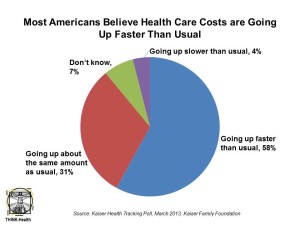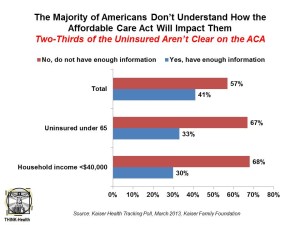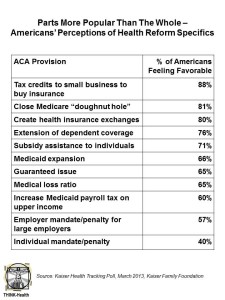 While health care cost growth has slowed nationally, most Americans feel they’re going up faster than usual. 1 in 3 people believe their own health costs have gone up faster than usual, and 1 in 4 feel they’re going out about “the same amount” as usual. For only one-third, health costs feel like they’re staying even.
While health care cost growth has slowed nationally, most Americans feel they’re going up faster than usual. 1 in 3 people believe their own health costs have gone up faster than usual, and 1 in 4 feel they’re going out about “the same amount” as usual. For only one-third, health costs feel like they’re staying even.
 As the second quarter of 2013 begins and the implementation of the Affordable Care Act (ACA, aka “health reform” and “Obamacare”) looms nearer, most Americans still don’t understand how the ACA will impact them. Most Americans (57%) believe the law will create a government-run health plan, which is not the case. And, the inclusion of “death panels,” the scenario where a government cabal could make decisions on end-of-life care for Americans on Medicare, is still an opinion held by 40% of Americans.
As the second quarter of 2013 begins and the implementation of the Affordable Care Act (ACA, aka “health reform” and “Obamacare”) looms nearer, most Americans still don’t understand how the ACA will impact them. Most Americans (57%) believe the law will create a government-run health plan, which is not the case. And, the inclusion of “death panels,” the scenario where a government cabal could make decisions on end-of-life care for Americans on Medicare, is still an opinion held by 40% of Americans.
Ironically, most of the people for whom health reform is targeted to positively impact — people who are uninsured and earn lower incomes — are more clueless about how the ACA will impact them, according to the March 2013 Kaiser Health Tracking Poll from the Kaiser Family Foundation.
The phrase “health insurance exchange” is a new one for most Americans, only 22% of whom know at least something about the expansion of health plans to uninsured Americans via the new marketplaces that will be in place as part of the Affordable Care Act’s implementation in 2014. 1 in 2 Americans knows “nothing at all” about their state’s decision to create a health insurance marketplace, according to the Kaiser Poll.
 When specific provisions of health reform are explained in some detail, many more people favor many of these specifics — a phenomenon which has been found through previous Kaiser Family Foundation surveys on health reform. Tax credits for small business to buy insurance, closing the Medicare Rx doughnut hole, creating health insurance exchanges (once explained), extending health coverage to dependents, providing subsidies to individual to buy insurance, guaranteed issue (insuring that consumers have access to insurance even with pre-existing conditions), regulating insurance companies’ medical loss ratios (percent of premiums spent on health care services for enrollees), all have majority support from Americans — Democrats, Independents, and Republicans alike. Only a few areas — expanding Medicaid, increase Medicare’s payroll tax on higher income people, and the mandates for employers and individuals — don’t have majority Republican support.
When specific provisions of health reform are explained in some detail, many more people favor many of these specifics — a phenomenon which has been found through previous Kaiser Family Foundation surveys on health reform. Tax credits for small business to buy insurance, closing the Medicare Rx doughnut hole, creating health insurance exchanges (once explained), extending health coverage to dependents, providing subsidies to individual to buy insurance, guaranteed issue (insuring that consumers have access to insurance even with pre-existing conditions), regulating insurance companies’ medical loss ratios (percent of premiums spent on health care services for enrollees), all have majority support from Americans — Democrats, Independents, and Republicans alike. Only a few areas — expanding Medicaid, increase Medicare’s payroll tax on higher income people, and the mandates for employers and individuals — don’t have majority Republican support.
Health Populi’s Hot Points: The most popular provisions of health reform — such as tax credits to small business for buying insurance, closing the Medicare doughnut hole, creating health insurance marketplaces, subsidizing individuals to buy health insurance, and regulating insurance companies’ medical loss ratios — are among the least understood among American taxpaying health citizens.
At the same time, Americans hold low expectations for the impact of the ACA 55% believe that health costs will increase for the nation and 49% believe costs will increase for them personally. The issue of health costs continues to rank first in the minds of all American health consumers.
The KFF survey reveals the need for at least two types of education and enlightenment American consumers need. The obvious track is to be clear about the ACA’s specific elements that impact people’s own health and health care. That most people in most need of understand these specifics – the uninsured and lower income Americans — means that the nation is building a system folks won’t be ready to access. This is yet another version of Field of Dreams in health care, where the field (or marketplace) is built, and consumers won’t come to buy in.
The second education track relates to educating people about how to use the health system in general, and engage in health. Health plans are already re-forming business strategies to get more consumer-focused. But it’s doctors and local hospitals where people have more trust, and some consumers will more readily engage in messages from their own providers. Patients themselves will educate each other, especially in social networks (informally offline and more formally online in consumer forums and disease-specific communities).
Media have done the poorest job of enlightening and empowering consumers with the real world details of health reform. Most consumers still aren’t aware of health insurance marketplaces, with a plurality of people also still believing in the existence of death panels and a National Health System writ large. While TIME magazine’s opus by Steve Brill, the cover story Bitter Pill, went far to educate readers on the ugly sausage-making aspects of health care delivery and pricing, people need more than knowledge.
Consumers need to understand, tactically, their own roadmaps to personalizing medicine and health care (including household health financing) for themselves.




 I am so grateful to Tom Lawry for asking me to pen the foreword for his book, Health Care Nation,
I am so grateful to Tom Lawry for asking me to pen the foreword for his book, Health Care Nation,  I love sharing perspectives on what's shaping the future of health care, and appreciate the opportunity to be collaborating once again with Duke Corporate Education and a global client on 6th May. We'll be addressing some key pillars to consider in scenario planning such as growing consumerism in health care, technology (from AI to telehealth), climate change, and trust -- the key enabler for health engagement or dis-engagement and mis-information. I'm grateful to be affiliated with the corporate education provider
I love sharing perspectives on what's shaping the future of health care, and appreciate the opportunity to be collaborating once again with Duke Corporate Education and a global client on 6th May. We'll be addressing some key pillars to consider in scenario planning such as growing consumerism in health care, technology (from AI to telehealth), climate change, and trust -- the key enabler for health engagement or dis-engagement and mis-information. I'm grateful to be affiliated with the corporate education provider  Thank you FeedSpot for
Thank you FeedSpot for